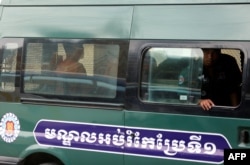For former Radio Free Asia reporter Yeang Sothearin, life took a drastic turn when Cambodian police came to detain him and his colleague Uon Chhin in November 2017. They were accused of conspiring with foreign powers, charges they have since denied.
“My son is 10 and my daughter is eight, but when I was in prison, I tried to hide [it from] them … I told them I went to study to continue my PhD degree at Prey Sar [prison] – they did not know that it was a prison," said Sothearin.
"They missed me so much, they said, ‘Oh papa, you should stop studying, come back home.’ But I tried to convince them and I said I need to continue my study until I pass the exam and maybe come back.”
His children learned the truth anyway through social media. And while the two reporters were released in August last year and reunited with their families, the charges have not been dropped. About a month ago, the investigating judge forwarded the case for trial.
Sothearin denies all charges, and believes his arrest was a response to RFA’s government-critical reporting, as well as an effort “to silence independent journalists who dare to write anything that could be negative of the government.”
Sothearin’s and Unon Chhin’s case had been slammed by Reporters Without Borders (RSF), which has criticized a “ruthless crackdown” in Cambodia on journalists.
In a report titled A Cycle of Fear, recently published ahead of World Press Freedom Day on May 3, the organization says censorship "has become the norm” in Cambodia.
The country fell by one spot in RSF's annual ranking, from 142 to 143 out of 180 countries. Last year, Cambodia fell by 10 slots.
Over the past two years, the independent newspaper Cambodia Daily was forced to shut down, Radio Free Asia was compelled to close its office in the country, and more than 30 radio stations saw their licenses revoked.
Just days after the Reporters Without Borders report last year, the “last bastion of the independent press, the Phnom Penh Post, was bought by a Malaysian businessman with ties to the Cambodian government," this year's report says.
“Journalists who still dare to do investigative reporting on subjects that are not to the regime’s liking, such as prostitution of minors, are imprisoned,” the report reads.
Cambodia's Interior Minister Sar Kheng, after the report was released, said the government is committed to strengthening democracy.
But Sothearin, who now works for an NGO, said he can no longer work as a journalist because he is still under court supervision. “When I write an article that might [make] someone not happy with me, they might take action against me again,” he said.
Government official Huy Vannak says Sothearin's fears are unfounded. Vannak, who simultaneously serves as undersecretary of state at the interior ministry and head of the Union of Journalist Federations of Cambodia, argued that Cambodian reporting merely lacks quality, not freedom.
“You have to dare to challenge,” he said. “I don’t see anyone go to jail because of your writing. Only if you have a mistake.”
For Sothearin, challenging the government was part of his job. He is still waiting to see evidence in the case against him and his colleague, he said.
While the case is still pending, his children keep asking whether he will go back to prison, he said. And with his passport confiscated, he cannot leave the country, even to visit his parents in an area that is now part of neighboring Vietnam.
Some journalists in Cambodia say they are forced to practice self-censorship, steering away from topics that could get them in trouble with the authorities.
Thai Sothea, founder of the news site Cambonomist, said he stays clear from politics as it is too sensitive of an issue. Instead, he focuses on business news. “I have to admit that we have a relatively high level of self-censorship…. We know for sure how far we can go,” he said.
Sothea said his focus on business allows him to continue to work as a journalist. “I have to try to be someone that can still inform the public in a way that keeps myself safe,” he said.
But Vannak insisted that accusations of self-censorship by journalists are based on a cultural misunderstanding.
“I think that is a wrong perception of [a] different culture. In Cambodia what we say it’s self-awareness…. Everyone has self-awareness [here], you know [to] follow the code of ethics what is right and what is wrong, I think it’s a normal practice that everyone has to have self-awareness ….
"You see our culture, [it] is [a] more respectful culture, we are Buddhists, we listen to teachers, we listen to monks, and listen to fathers and parents,” he said.





